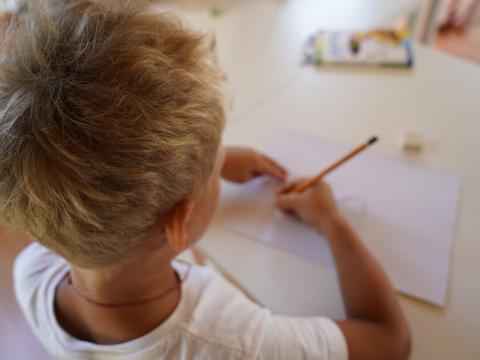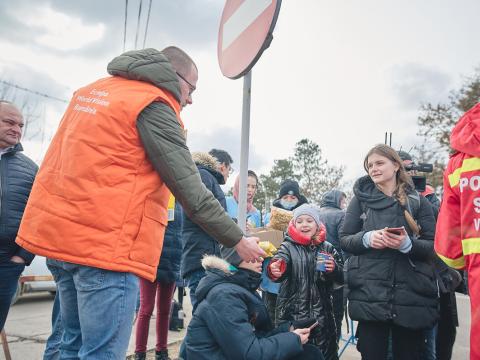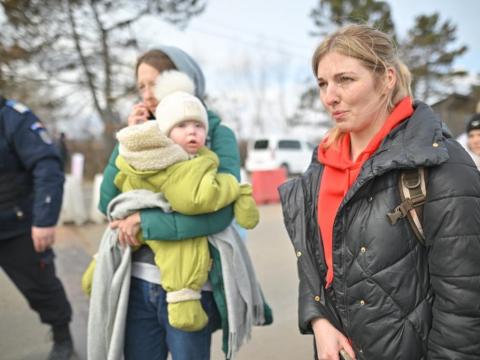
A generation of Ukrainian children risk losing years of education
Six months on, Jennifer Neelsen appeals to host and donor governments to ensure Ukraine’s children have what they need to thrive at school.
This crisis is more than a conflict, and it’s more than one of history’s largest displacements. It is an education crisis and a crisis in children’s mental health. Thousands of Ukrainian children are not getting the proper support for education, which puts them at risk of losing years of schooling and social development.
Let us imagine a 13-year-old boy, Stefan. He fled the violence with his mom and grandmother and ended up in Romania. He has suffered the trauma of fleeing violence and the uncertainty of knowing where he and his family will end up. He is in a new country where his family does not know the language and is separated from their community. As the academic year approaches, he, and his family, want to return to Ukraine. He misses his old school, his old teachers, and his old friends. He struggles emotionally and mentally because he misses his old life and, of course, his father, who is still there fighting the war. He does not want to start again at a new school where he is a ‘refugee’ and does not speak the language.
Like Stefan, so many children still suffer from the trauma of war – witnessing violence, fleeing their lives, homes, toys, clothes, and loved ones when the fighting reaches their towns and cities. Safe and consistent education should be something grounding, to focus on and provide a sense of stability. But a variety of things can make getting a proper education difficult or hugely stressful.
Stefan must wrestle with lessons in a new language if he stays in Romania. There are only a few counselling services to support his mental health. There’s little effort to integrate him into the school environment. And, if Stefan was one of the thousands of children with a disability, most schools are not set up to support that. Many children like Stefan will not be starting school because they have not yet been registered because parents are still hopeful that they will be able to return home soon.
Even if they could go back to Ukraine, there is no guarantee that Stefan’s school buildings have not been destroyed in the fighting; or that the school has a suitable bomb shelter; or that the school still has access to heating or money to pay fuel bills. Winter is coming to Ukraine. Is the answer online lessons? Ukraine's education system did well during the COVID-19 pandemic, with many lessons going digital. But then again, students can only take their end-of-year exams in person, so Stefan cannot move up a year until he returns home. This means he might miss one or more years and must retake them when he finally gets home.
This in-between life is causing them all severe anxiety.
World Vision is doing all it can to address these challenges of access to education, mental and emotional health and integration in the host community systems and structures. Six months into this conflict, we are calling on the host and international governments to do all they can and financially to:
-
Provide or call for educational modification to ease Ukrainian children into local education which can include providing counselling, lessons in Ukrainian, or meeting special needs.
-
Consider the needs of children holistically- and provide mental health support to do well in school and thrive.
-
Advocate with the education authorities in both host countries and Ukraine to ask them to work together to provide appropriate education to refugee children.
We must not let these children fall victims to what has become an educational and mental health crisis. These children depend on us to make things right.
Jennifer Neelsen is one of World Vision’s Emergency Response Directors. She previously led World Vision’s Global Covid-19 Emergency Response (COVER). Learn more about World Vision’s Ukraine Crisis Response (UCR). Learn more about World Vision’s COVID-19 response.
Ukraine Conflict Statistics
-
An estimated of 348 children are among the 5,237 civilians killed during the conflict so far, with OHCHR reporting almost 560 children among the 7,035 civilians injured.
-
A generation of children is being scarred by the war, with 1.5 million children in danger of issues including anxiety, depression and social impairment, according to a World Vision report. Ukrainian parents say their biggest worry is the mental health of their children.
-
The Ukraine Education Ministry estimates that about 2,300 educational institutions have been affected by the hostilities, 286 of which have been destroyed. One in ten schools and learning facilities (3,500 out of 31,347) are not available for educational activities.
Learn more about World Vision's Ukraine Response.


